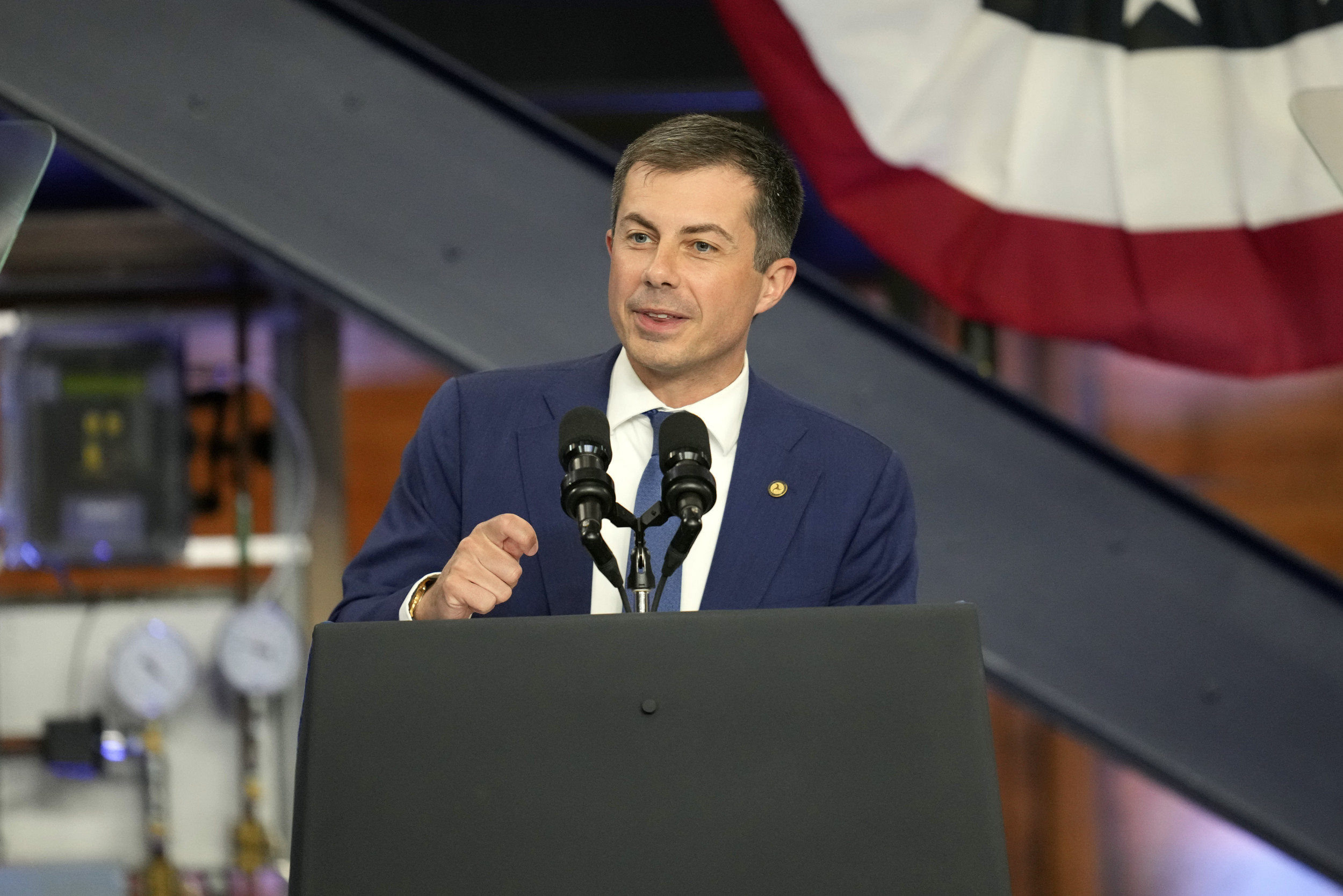Alaska
Federal infrastructure grants will remove, replace and restore culverts in multiple Alaska communities
/cloudfront-us-east-1.images.arcpublishing.com/gray/LPNUDIPSHRFQ3DT53KTSU57JWM.jpg)
ANCHORAGE, Alaska (KTUU) – A U.S. Department of Transportation program is set to fund nearly $45 million in project support across multiple Alaska communities as they look to strengthen fish habitats.
Along with Alaska, the Biden Administration announced this past week that money from the National Culvert Removal, Replacement, and Restoration Grant Program, through the Culvert Aquatic Organism Passage Program, will go to various regions across the country, primarily to Pacific communities, but to others as well, including on the East Coast.
“We’re announcing the first $200 million of funding, from that new program, to improve or even remove or fix or upgrade culverts (nationwide) that are currently in a degraded condition,” U.S. Department of Transportation Secretary Pete Buttigieg said. “A number of those grants are coming right here to Alaska, and we know that’s going to make a big difference.”
Culverts are drains or waterway crossings under roads, railroads and other infrastructure that carry water but can be deadly to fish and other animals that can get stuck trying to pass through. They are also one of the factors being blamed for declining populations of salmon in some areas.
Through the grants, the U.S. Department of Transportation is honing in on culverts to fix and remove 169 culvert barriers and help improve fish passage.
“Not just for the fish, but for the people who count on the health of those fish stocks,” Buttigieg said, “and the ability of that fish passage to take place, for their ways of life and their livelihoods.”
Cherie Northon, of the Anchorage Waterways Council, explained that while culverts are meant to be a help, they can easily become a hindrance.
“It either has to be by a bridge or a culvert,” Northon said, of water passing through already-existent infrastructure. “And if they’ve done these 50, 60, 70 years ago, they’re usually too small, they’re under-powered for the capacity, and also, the metal fatigues, it rusts, and besides blockages, and being too small, it can actually fall apart or actually be crushed down or fill up with debris.”
Wild Salmon Center Director of Government Affairs Jessica Helsley told the Associated Press that the efforts to improve fish crossings – including advocating for the removal of culverts – will be much stronger with the federal government as a supporter.
“It creates a new unique dialogue that otherwise might have been a little slower to develop,” Helsley said. “It used to be you’d go talk to an infrastructure department and say, ‘I’m here to talk fish,’ and you’d get ignored. Well, now, thanks to Congress, you can say, ‘I’m here to talk fish, and I have money to work with.’”
The program will support projects in the Metlakatla Indian Community, Matanuska-Susitna Borough, Klawock, King Salmon, Valdez, Cordova, Yakutat City and Borough, and Houston, and is meant to help with the replacement, removal and repair of culverts so that there are better passage options for fish born in freshwater streams and rivers to migrate back to freshwater for spawning.
Alaska’s congressional delegation reacted to the funding announcement in full support.
“The infrastructure law is allowing Alaska communities to repair and replace failing and aging infrastructure,” said Sen. Lisa Murkowski, R-Alaska, touting the massive bipartisan spending package. “Projects from Metlakatla to King Salmon will not only build more resilient culverts to address future flooding events, but also support critical salmon and fish populations so many communities in Alaska rely on.”
Sen. Dan Sullivan, R-Alaska, shared similar sentiments and added that he appreciated the recognition of Alaska’s request for funding.
“These projects will not only support Alaska salmon,” he said, “but will also help continue to provide a much-needed food source for Alaskans.”
Alaska’s lone congresswoman, Rep. Mary Peltola, D-Alaska, said the money will help tremendously.
“Protecting our fish doesn’t just happen in the ocean – how we build our roads and other infrastructure on land matters, too,” Peltola said. “This funding, nearly $45 million from the Bipartisan Infrastructure Law, will help improve our infrastructure and restore crucial habitats across several regions to help a variety of fish species complete their life cycles and find their way home.
“Additionally,” she continued, “these projects will help reduce flood risks, provide jobs and protect the lives and livelihoods of Alaskans who rely on fish every day. This is one more example of bipartisan, pro-fish policy working for Alaska.”
You can view the full list of funded projects by clicking here.
Copyright 2023 KTUU. All rights reserved.

Alaska
Federal funds will help DOT study wildlife crashes on Glenn Highway

New federal funds will help Alaska’s Department of Transportation develop a plan to reduce vehicle collisions with wildlife on one of the state’s busiest highways.
The U.S. Transportation Department gave the state a $626,659 grant in December to conduct a wildlife-vehicle collision study along the Glenn Highway corridor stretching between Anchorage’s Airport Heights neighborhood to the Glenn-Parks Highway interchange.
Over 30,000 residents drive the highway each way daily.
Mark Eisenman, the Anchorage area planner for the department, hopes the study will help generate new ideas to reduce wildlife crashes on the Glenn Highway.
“That’s one of the things we’re hoping to get out of this is to also have the study look at what’s been done, not just nationwide, but maybe worldwide,” Eisenman said. “Maybe where the best spot for a wildlife crossing would be, or is a wildlife crossing even the right mitigation strategy for these crashes?”
Eisenman said the most common wildlife collisions are with moose. There were nine fatal moose-vehicle crashes on the highway between 2018 and 2023. DOT estimates Alaska experiences about 765 animal-vehicle collisions annually.
In the late 1980s, DOT lengthened and raised a downtown Anchorage bridge to allow moose and wildlife to pass underneath, instead of on the roadway. But Eisenman said it wasn’t built tall enough for the moose to comfortably pass through, so many avoid it.
DOT also installed fencing along high-risk areas of the highway in an effort to prevent moose from traveling onto the highway.
Moose typically die in collisions, he said, and can also cause significant damage to vehicles. There are several signs along the Glenn Highway that tally fatal moose collisions, and he said they’re the primary signal to drivers to watch for wildlife.
“The big thing is, the Glenn Highway is 65 (miles per hour) for most of that stretch, and reaction time to stop when you’re going that fast for an animal jumping onto the road is almost impossible to avoid,” he said.
The city estimates 1,600 moose live in the Anchorage Bowl.
Alaska
Flight attendant sacked for twerking on the job: ‘What’s wrong with a little twerk before work’

They deemed the stunt not-safe-for-twerk.
An Alaska Airlines flight attendant who was sacked for twerking on camera has created a GoFundMe to support her while she seeks a new berth.
The crewmember, named Nelle Diala, had filmed the viral booty-shaking TikTok video on the plane while waiting two hours for the captain to arrive, A View From the Wing reported.
She captioned the clip, which also blew up on Instagram, “ghetto bih till i D-I-E, don’t let the uniform fool you.”
Diala was reportedly doing a victory dance to celebrate the end of her new hire probationary period.
Unfortunately, her jubilation was short-lived as Alaska Airlines nipped her employment in the bum just six months into her contract.
The fanny-wagging flight attendant feels that she didn’t do anything wrong.
Diala has since reposted the twerking clip with the new caption: “Can’t even be yourself anymore, without the world being so sensitive. What’s wrong with a little twerk before work, people act like they never did that before.”
The new footage was hashtagged #discriminationisreal.
The disgraced stewardess even set up a GoFundMe page to help support the so-called “wrongfully fired” flight attendant until she can land a new flight attendant gig.
“I never thought a single moment would cost me everything,” wrote the ex-crewmember. “Losing my job was devastating.”
She claimed that the gig had allowed her to meet new people and see the world, among other perks.
While air hostessing was ostensibly a “dream job,” Diala admitted that she used the income to help fund her “blossoming lingerie and dessert businesses,” which she runs under the Instagram handles @cakezncake (which doesn’t appear to have any content?) and @figure8.lingerie.
As of Wednesday morning, the crowdfunding campaign has raised just $182 of its $12,000 goal.
Diala was ripped online for twerking on the job as well as her subsequent GoFundMe efforts.
“You don’t respect the uniform, you don’t respect your job then,” declared one critic on the popular aviation-focused Instagram page The Crew Lounge. “Terms and Conditions apply.”
“‘Support for wrongly fired flight attendant??’” mocked another. “Her GoFund title says it all. She still thinks she was wrongly fired. Girl you weren’t wrongly fired. Go apply for a new job and probably stop twerking in your uniform.”
“The fact that you don’t respect your job is one thing but doing it while in uniform and at work speaks volumes,” scoffed a third. “You’re the brand ambassador and it’s not a good look.”
Alaska
As Alaska sees a spike in Flu cases — another virus is on the rise in the U.S.

FAIRBANKS, Alaska (KTUU) – Alaska has recently seen a rise in both influenza and respiratory syncytial virus, better known as RSV. Amidst the spike in both illnesses, norovirus has also been on the rise in the United States. The Centers for Disease Control and Prevention (CDC) says it’s highly contagious and hand sanitizers don’t work well against it.
Current data for Alaska shows 449 influenza cases and 262 RSV cases for the week of Jan. 4. Influenza predominantly impacts the Kenai area, the Yukon-Kuskokwim Delta, and the Northwest regions of the state. RSV is also seeing significant activity in the Yukon-Kuskokwim Delta and Anchorage.
Both are respiratory viruses that are treatable, but norovirus — which behaves like the stomach flu according to the CDC — is seeing a surge at the national level. It “causes acute gastroenteritis, an inflammation of the stomach or intestines,” as stated on the CDC webpage.
This virus is spread through close contact with infected people and surfaces, particularly food.
“Basically any place that people aggregate in close quarters, they’re going to be especially at risk,” said Dr. Sanjay Gupta, CNN’s Chief Medical Correspondent.
Preventing infection is possible but does require diligence. Just using hand sanitizer “does not work well against norovirus,” according to the CDC. Instead, the CDC advises washing your hands with soap and hot water for at least 20 seconds. When preparing food or cleaning fabrics — the virus “can survive temperatures as high as 145°F,” as stated by the CDC.
According to Dr. Gupta, its proteins make it difficult to kill, leaving many cleaning methods ineffective. To ensure a given product can kill the virus, he advises checking the label to see if it claims it can kill norovirus. Gupta said you can also make your own “by mixing bleach with water, 3/4 of a cup of bleach per gallon of water.”
For fabrics, it’s best to clean with water temperatures set to hot or steam cleaning at 175°F for five minutes.
As for foods, it’s best to throw out any items that might have norovirus. As a protective measure, it’s best to cook oysters and shellfish to a temperature greater than 145°F.
Based on Alaska Department of Health data, reported COVID-19 cases are significantly lower than this time last year.
See a spelling or grammatical error? Report it to web@ktuu.com
Copyright 2025 KTVF. All rights reserved.
-
/cdn.vox-cdn.com/uploads/chorus_asset/file/25822586/STK169_ZUCKERBERG_MAGA_STKS491_CVIRGINIA_A.jpg)
/cdn.vox-cdn.com/uploads/chorus_asset/file/25822586/STK169_ZUCKERBERG_MAGA_STKS491_CVIRGINIA_A.jpg) Technology7 days ago
Technology7 days agoMeta is highlighting a splintering global approach to online speech
-

 Science4 days ago
Science4 days agoMetro will offer free rides in L.A. through Sunday due to fires
-
/cdn.vox-cdn.com/uploads/chorus_asset/file/25821992/videoframe_720397.png)
/cdn.vox-cdn.com/uploads/chorus_asset/file/25821992/videoframe_720397.png) Technology1 week ago
Technology1 week agoLas Vegas police release ChatGPT logs from the suspect in the Cybertruck explosion
-

 Movie Reviews1 week ago
Movie Reviews1 week ago‘How to Make Millions Before Grandma Dies’ Review: Thai Oscar Entry Is a Disarmingly Sentimental Tear-Jerker
-

 Health1 week ago
Health1 week agoMichael J. Fox honored with Presidential Medal of Freedom for Parkinson’s research efforts
-

 Movie Reviews1 week ago
Movie Reviews1 week agoMovie Review: Millennials try to buy-in or opt-out of the “American Meltdown”
-

 News1 week ago
News1 week agoPhotos: Pacific Palisades Wildfire Engulfs Homes in an L.A. Neighborhood
-

 World1 week ago
World1 week agoTrial Starts for Nicolas Sarkozy in Libya Election Case



















